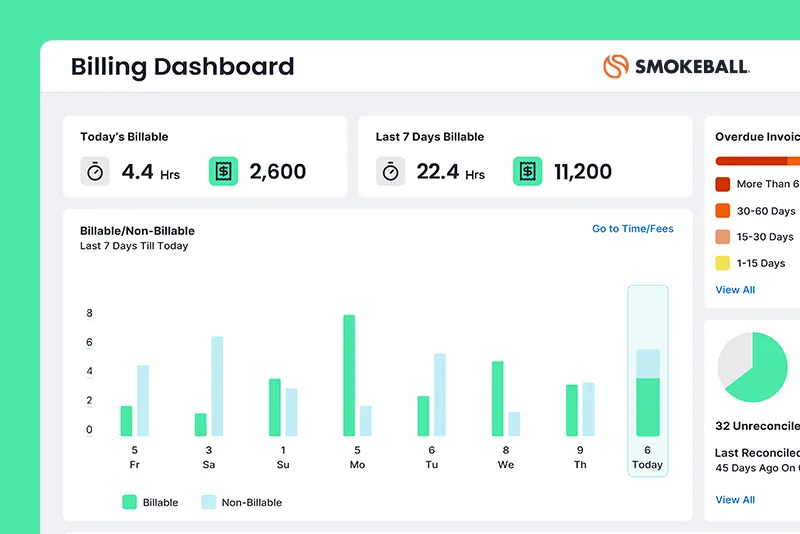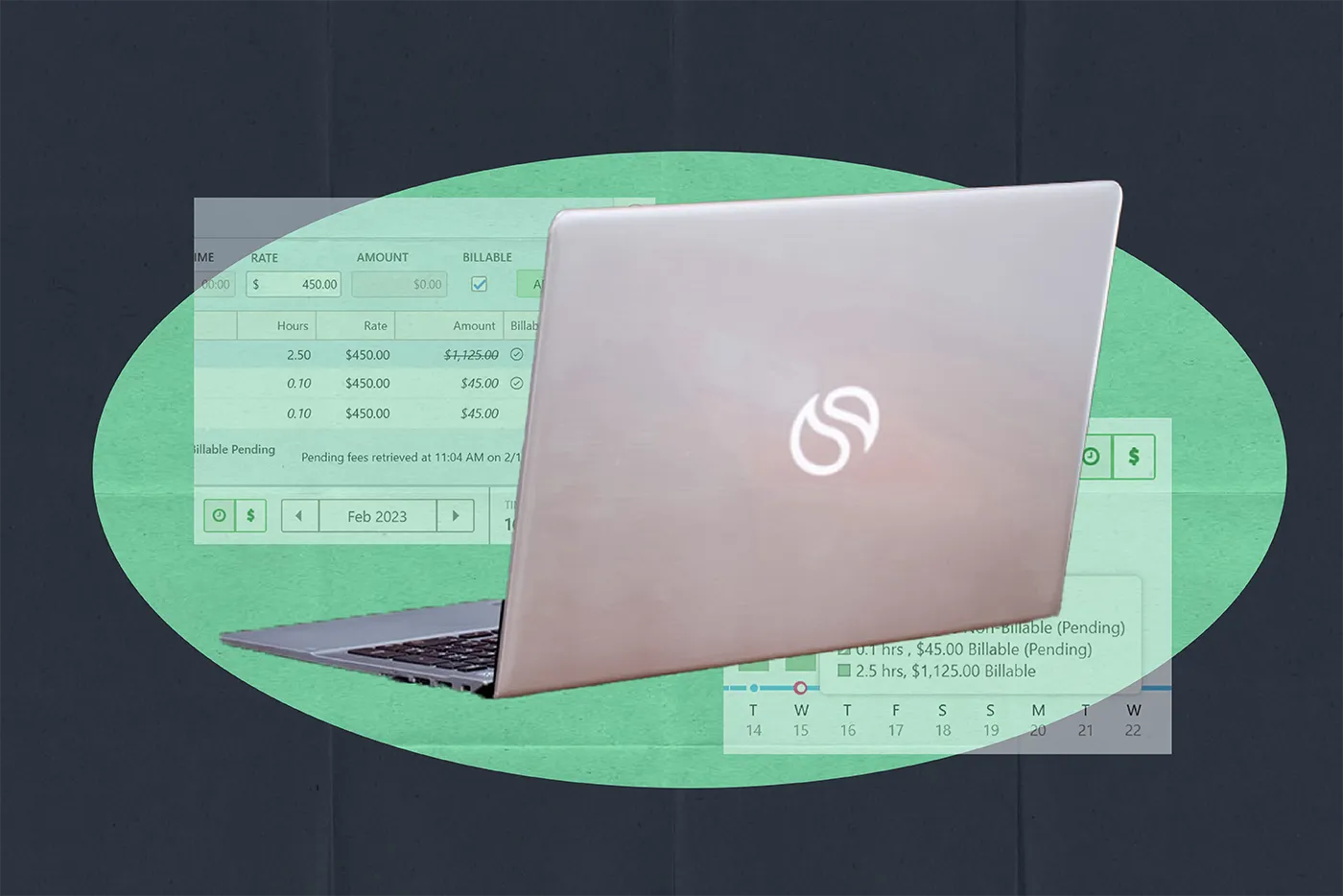What Percent of Lawyer Hours are Billable?
Written by
|
February 26, 2025
Written by Smokeball
|
February 26, 2025

Written by Jordan Turk
|
February 26, 2025

For many law firms, maximizing billable hours is a constant challenge. Despite working long hours, lawyers often struggle to track and account for every minute spent on client-related work. This discrepancy between total hours worked and billable hours can significantly impact a firm’s revenue and long-term profitability.
Knowing how much of a lawyer's time is actually billable plays a big role in determining their pay and the success of the firm as a whole. In this blog, we'll explore the usual percentage of billable hours in the legal field, the various factors that affect this figure (such as non-billable administrative tasks), and how law firms can use technology to boost their billing efficiency — and ramp up their revenue.
Understanding billable hours
Billable hours refer to the time a lawyer spends working on a client’s case that can be billed directly to the client, typically in six-minute, ten-minute, or fifteen-minute increments. This is the standard billing method used by law firms, especially in practices like real estate law, litigation, and family law. Lawyers track their time meticulously, making sure that every task directly related to client matters is logged as billable hours — which contributes to the firm’s revenue.
Non-billable hours, on the other hand, are tasks that cannot be charged to clients. These include administrative duties, such as intake, time keeping, sending out invoices, client communications that don't directly pertain to case work, and internal meetings. While non-billable tasks are essential for a firm’s operations, they don’t generate revenue. That's why maximizing billable hours is a top priority.
The percentage of billable hours directly impacts a firm’s profitability. The more billable hours a lawyer can track and document, the greater their contribution to the firm’s bottom line. Often, there is significant pressure on lawyers to meet annual billable hour targets that are usually set by the firm. Failure to meet these targets can affect compensation and career advancement, creating a high-stakes environment where efficiency in billing will go a long way.

A look at what percent of lawyer hours are billable
On average, lawyers typically bill 30 - 40% of their total working hours.1 This means that lawyers who work a full 10-hour day in the office may only be able to bill for 4 hours of that time — which can have disastrous consequences for many firms. In fact, research from the American Bar Association and other industry reports suggest that most lawyers only manage to bill around 1,600-1,800 hours annually out of the 2,000 hours they work in a year. That’s basically an entire month’s worth of hours that was not billed to the client!
Several factors influence how much time is actually billable.
- Firm Size & Structure: In larger firms, lawyers often have more administrative support, allowing them to focus more on client work and increasing billable hours. Smaller firms, however, may require lawyers to perform more non-billable tasks, such as managing their own billing and handling office duties, reducing their overall billable percentage.
- Practice Area: Billable hours can vary significantly by practice area. For example, corporate and litigation lawyers often have higher billable hour percentages because their work is more consistent and they typically deal with clients who are corporations and larger.. On the other hand, lawyers in family law, estate planning, or public interest law may see lower billable hours due to the nature of their work, which can involve more non-billable client interactions and administrative tasks.
- Lawyer Experience: Senior lawyers or specialists may have an easier time logging billable hours because they tend to handle complex cases that require more time, leading to higher billable totals. In contrast, newer lawyers or those in less specialized roles may struggle to accumulate the same level of billable time due to less direct client work or the need for more supervision.
Firms can really up their game and increase profits by understanding how much of their time is billable and what affects that. Tools like Smokeball's legal billing solutions make it easier to track time, so lawyers can (1) figure out their actual billing percentages; (2) record more hours; and (3) spend less time on admin tasks.
RELATED: See How Smokeball Will Transform Your Law Practice
1 This statistic can vary depending on the size and structure of the firm, the lawyer's practice area, and their experience level.
Challenges in tracking billable hours
Tracking billable hours can be a time-consuming and error-prone process, especially when done manually or without the aid of proper tools. Lawyers often face difficulties in recording every minute spent on client-related work, which can lead to lost time and inaccurate reporting. For instance, a lawyer might forget to log an important phone call or meeting, resulting in unaccounted time that should have been billed to the client.
Or, some lawyers will wait to record their hours until the end of the month, which means they spend hours trying to recreate their time and figure out what they were doing two Tuesdays ago. Manually tracking hours also increases the likelihood of human error, further compromising billing accuracy. Balancing administrative and non-billable tasks adds another layer of complexity. Lawyers are often tasked with handling office duties, managing paperwork, and organizing case files — activities that cannot be billed to clients but still consume valuable time.
This non-billable work reduces the time available for client-related tasks, impacting the overall number of billable hours. Client meetings, research, and legal documentation may not always be tracked efficiently, especially when lawyers are juggling multiple cases at once. Without a streamlined legal billing system to capture and categorize billable activities, firms risk losing revenue and struggling to meet productivity goals.

How can Smokeball help make sense of what percent of lawyer hours are billable?
Smokeball’s legal billing technology is specifically designed to address the common challenges law firms face in tracking billable hours. One of its standout features is automated time tracking, which allows lawyers to focus on their work rather than manually recording each billable task. Smokeball tracks every action within the system—whether it’s a client email, phone call, or document update—automatically, ensuring that no time is missed or forgotten.
And, at the end of every day, Smokeball gives you a timesheet of everything you did, for how long, and on what cases, so that you can simply move those tasks to a draft invoice. This eliminates the need for manual entry and reduces the chances of human error that often occur with traditional time tracking methods.
The platform’s efficiency and accuracy improvements are significant. By automating time tracking, Smokeball minimizes the need for tedious data entry, reducing the likelihood of mistakes and ensuring that all billable activities are accurately captured. This not only saves time but also boosts a law firm’s ability to meet its revenue goals by increasing the percentage of billable hours captured.
With Smokeball’s seamless integration with other practice management tools, such as document management and client communication platforms, the firm was able to streamline its operations and enhance efficiency across the board, leading to higher revenue and a smoother billing process.
By integrating time tracking with other critical practice management tools, Smokeball helps law firms maximize their profitability while simplifying administrative tasks.
Tips to maximize billable hours
To maximize billable hours, law firms should implement the following strategies:
- Set Clear Billing Policies: Establish clear billing practices and expectations for both clients and lawyers. By defining what constitutes billable work upfront, firms can prevent misunderstandings and ensure consistent billing practices.
- Track Everything: Make it a habit to track all work and interactions with clients, including those that might seem non-billable. Small tasks like emails, phone calls, and research can quickly add up, and tracking every minute ensures nothing is missed.
- Use Technology: Leverage legal software like Smokeball to simplify timekeeping and billing processes. Smokeball’s automated time tracking captures billable activities without extra effort, reducing errors and improving efficiency.
- Prioritize Client Work: Reduce non-billable time by delegating administrative tasks to non-lawyer staff. Activities such as scheduling, document filing, and basic research can be handled by support staff, allowing lawyers to focus on income-generating client work.
By following these tips, law firms can boost their billable hours and improve profitability while keeping processes efficient and streamlined.

Unlock the full potential of your billable hours with Smokeball
Smokeball's legal billing tech makes time tracking a breeze and works smoothly with other practice management tools, boosting both accuracy and efficiency. By getting a grip on and improving billable hours, law firms can ramp up their revenue and cut down on admin costs — leading to better profits.
To discover how Smokeball can transform your firm’s billing practices and improve your bottom line, schedule a demo today. Explore our powerful legal billing solutions across practice areas and start maximizing your billable hours.
Learn more about Smokeball document management for law firms:
Book Your Free Demo
Ready to see how Smokeball client intake software helps you Run Your Best Firm? Schedule your free demo!















